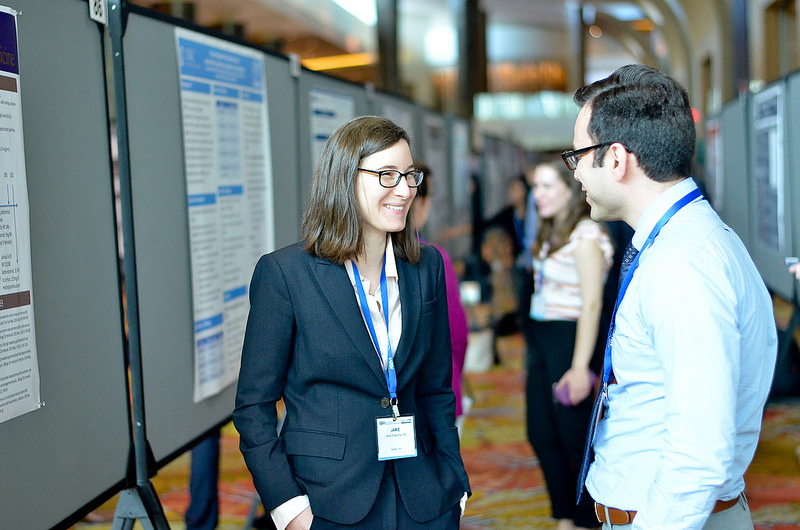Clinical TraininG
Year 1: Clinical training
Years 2 & 3 (3rd year is optional for those pursuing an academic career): Focused research training and continuity clinics
Our clinical training program has multiple outpatient and inpatient sites to fulfill cross-training requirements in adult and pediatric AI.
Fellows individualize their training using:
- Diverse clinic populations
- Extensive subspecialty electives
- Formal didactics
- Mentored scholarly activity
Fellows gain exposure to the most severe/complex cases of asthma, rhinosinusitis, drug/food/venom allergy, anaphylaxis, immunodeficiency, systemic mastocytosis, and eosinophilic disorders and become experts in outpatient food and drug challenges and aspirin and other drug desensitizations.
Our program is a national referral center for pediatric and adult patients with primary immunodeficiency disorders (PIDD) and fellows become proficient in the evaluation and treatment of patients with PIDD including use of IVIG, immunomodulators, and bone marrow transplantation for severe combined immune deficiencies (SCID) or SCID-like disorders.
Conferences
Educational conferences are a key learning feature of our training program. Fellows participate in a variety of educational sessions as described below. They are expected to attend the regional Pacific Northwest Allergy Forum and national American Academy of Allergy, Asthma & Immunology (AAAAI) meeting and are expected to present their work when it is sufficiently mature.

Topics in Allergy and Immunology Teaching Series
Each Tuesday, the Allergy faculty conducts a teaching conference where fellows present a topic (both basic and clinical) for at least two of the sessions annually. At other sessions, the faculty and invited guest speakers give presentations or lead discussions of key Allergy and Immunology journal articles.
ABAI Board Review Sessions
We expect our fellows to take the American Board of Allergy and Immunology (ABAI) examination to achieve board certification in the subspecialty. A structured curriculum of allergy and immunology topics is presented on Wednesdays by faculty to prepare fellows for the ABAI examination.
Immunology Lecture Series
Faculty lectures on immunology topics are given bimonthly. Fellows present cases to the immunology faculty with the goal of developing insightful differential diagnoses and linking them to the pathophysiology of the immune system. Once monthly, there is a teaching conference to acquaint fellows with indications for hematopoietic cell transplant in patients with primary immunodeficiency.
Scholarly and QI Activities
Fellows are expected to complete a scholarly project and participate in QI activities during their training. Fellows present their findings at local, national or international meetings, and publish in peer-reviewed publications (case reports, review articles and chapters).
Clinical Projects Completed by Fellows
- Case report: Hypereosinophilic syndrome presenting as coagulopathy (Aukstulolis K 2022)
- Review: Omalizumab for Chronic Urticaria in Children Less than 12 Years of Age (Al-Shaikhly T, 2019)
- Case Report: Immunodeficiency in MIRAGE Syndrome (Patel JP, 2017)
- Case Report: IKBA Gain-of-Function Mutation in a Female Presenting With Infections and Hyper IgM, but Without Ectodermal Dysplasia (Swanson C, 2017)
- Review: Combination omalizumab and mepolizumab therapy for refractory allergic bronchopulmonary aspergillosis (Lenington J, 2017)
- Review: From clinical observations and molecular dissection to novel therapeutic strategies for primary immunodeficiency disorders (Petroni D, 2017)
- Review: Approach to the evaluation of adverse antibiotic reactions in patients with cystic fibrosis (Petroni D, 2016)
- Chapter: Lipid Mediators in Aspirin-Exacerbated Respiratory Disease (Parker AR, 2016)
- Chapter: Hematopoietic Stem Cell Transplant for Immune Deficiency and Immune Dysregulation Disorders (Hagin D, 2015)
- Chapter: Primary immunodeficiency disorders: classification, new molecular insights, and approach to diagnosis and treatment (Hagin D, 2014)
- Case Report: Successful desensitization to rosuvastatin in a patient with a history of anaphylaxis to multiple statins (Khan FS, 2013)



